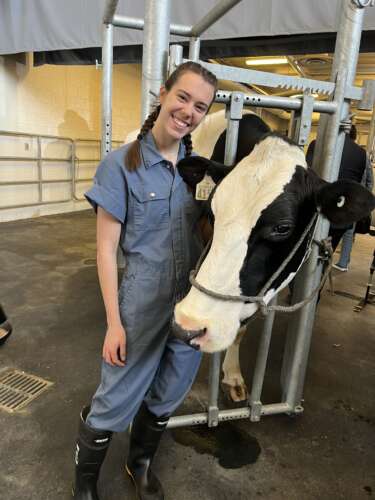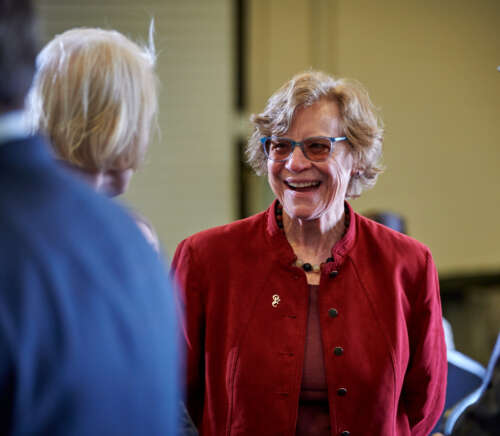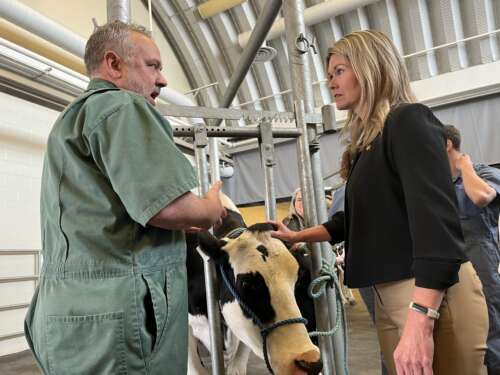For the first time in more than 30 years, the Ontario Veterinary College at the University of Guelph is expanding its Doctor of Veterinary Medicine (DVM) program to train more veterinarians in partnership with Lakehead University.
OVC, the only veterinary college in Ontario, has for decades filled its coveted seats from a growing number of highly qualified applicants every year. Turning away those who dream of studying and practicing veterinary medicine is heartbreaking.
The new Collaborative Doctor of Veterinary Medicine Program, in partnership with Lakehead University in Thunder Bay, is the first step in training the veterinarians of tomorrow while addressing the workforce shortages challenging the industry today.
Made possible by an historic $14.7 million investment from the Government of Ontario, the new DVM program is a unique initiative with an eye on rural, northern and Indigenous communities – those with the most critical need.
Veterinary workforce shortages most acute in northern, rural areas
The new DVM program will train 20 additional students each year, increasing the number of Ontario-based veterinary graduates by 20 per cent, a critical investment in a field where workforce shortages began prior to COVID-19 and intensified over the pandemic.
“The idea of a collaborative program with Lakehead U, a leading comprehensive university, was conceived a few years ago in response to a growing veterinary service crisis in many of our rural and northern communities,” says Dr. Jeff Wichtel, OVC dean, who began his veterinary career as a mixed animal practitioner specializing in large animals.

“It has been remarkable to see the support the idea has received from stakeholders throughout Ontario,” he adds.
Student veterinarian Rachel Schuster, whose father is also a veterinarian who trained at OVC, agrees the expansion is long awaited. “I’m excited that I get to be here to see it start.”
Schuster grew up part-time in northern Ontario and has been mentored by family friend Dr. Keith Good, a veterinarian with a large-animal practice outside Sault Ste. Marie, witnessing first-hand what life is like for a northern-based vet.
“I’m a country girl at heart,” says the second-year DVM student. “I love the north, I love how rural it is and I’m quite passionate about the fact there aren’t a lot of veterinarians there.”
The impact of the workforce shortage is what drove her to a career in veterinary medicine.
“Improving veterinary access is something I’m very passionate about,” she says, explaining that access to veterinary care can sometimes be taken for granted, particularly in urban areas.
Following her 2025 graduation Schuster is planning a return to the north to develop the kind of connections and mentorship she experienced. “I think we feel a responsibility to carry this on,” she says. “It is a really terrific opportunity to pay it forward.”
Students in the new DVM program will spend their first two years at Lakehead and then complete their remaining two years at OVC with opportunities to return to the north for externships in the final clinical year. Prospective students from the north bring with them connections to the agriculture sector, current veterinary services and cultural understanding.
Sustaining northern agriculture
Expanding veterinary training in a way that offers new opportunities to students through the Lakehead collaboration is “a win on every front” explains Dr. Joanne Hewson, OVC associate dean, students and academic. “It ticks so many of the boxes of the things that are greatly needed in the profession and I’m just so pleased that OVC can be part of that.”
Veterinary shortages are most acute in northern and rural communities creating major obstacles to growth in the agri-food sector. Northern Ontario is home to dairy, beef, grain and oilseed, potato, fruit, vegetable and rainbow trout industries across more than 884,000 acres of farmland. With large geographical regions and dispersed populations, many producers do not have access to proper veterinary care, and some communities have none.
Agriculture cannot function without veterinarians, Hewson says. “It is a real conundrum for producers when they want to provide the best care for their animals, but they can’t access the veterinary care to make that possible.”
In the Rainy River District, there are just two veterinary clinics to service more than 150 large animal farms. Thunder Bay, 325 km to the west, has just one veterinary clinic that services nearly 100 more large animal farms.
“We really want to foster those veterinarians who love the lifestyle and sense of community in the north, who feel that’s where they belong, so they put down their roots and really feel invested in the agriculture community,” says Hewson.
“That’s the way to sustain northern agriculture.”
Veterinary medicine ‘a life choice’
The Ontario Veterinary College has been at the forefront of animal care since its founding in 1862. It ranks first in Canada and sixth globally for its faculty expertise, research innovation and an exceptional record of training generations of veterinarians.

Dr. Cate Dewey is one of those veterinarians; an OVC alum who went on to a private large animal practice before returning to teach at the college. She now serves as OVC’s assistant dean, special projects, and director of the One Health Institute. Dewey, originally from Sudbury, graduated in 1979 when there were no emergency veterinarian services.
She worked in a two-person clinic, on call every other day and every second weekend. “You work through the night calving a cow and you’ve got to be back at the office at 7:30 the next morning,” she describes. “It’s a life choice, not just a vocation.”
Veterinarians in smaller, more rural settings naturally become community leaders advising on councils and working with public health organizations, Dewey says. Their expertise is vital to the health and well-being of animals and humans.
Complex health issues such as infectious diseases, food safety, or antimicrobial resistance, are evidence that human, plant, animal and environment health are intrinsically connected and serve as the driving philosophy behind the One Health Institute. The new DVM program is designed to incorporate that approach to veterinary care, building on the collaborative effort of many disciplines at U of G working on some of the planet’s most complex animal, human and environmental health problems.
“There is no one on this planet who is not benefiting from the veterinarian contribution to One Health in some way,” offers Hewson. “Animals and humans are so interconnected.”
Both Dewey and Hewson serve on the interdisciplinary committee of academic and administrative leaders charged with designing and implementing the program, covering everything from recruitment and admissions to curriculum to the overall student experience. Their extensive knowledge and lived experiences as veterinarians will bring the new DVM program to life.
Indigenous culture will enrich learning
With the Government of Ontario’s support worth nearly $15 million, announced in the 2023 provincial budget, OVC’s surgical exercises training areas will be expanded to facilitate valuable hands-on student training for the larger DVM cohort. Construction of specialized labs and clinical facilities unique to veterinary science at Lakehead will include a purpose-built barn and clinical examination space.
Lakehead’s community outreach has created more than 120 active initiatives between the university and Indigenous partners. That positions Lakehead well to support recruitment efforts for the DVM program, making a career in veterinary medicine accessible, telling prospective students, “There’s a role for you as a veterinarian in Indigenous communities,” Dewey says.
Undergraduate students at Lakehead – 13 per cent of whom are Indigenous – are required to enrol in courses on Indigenous ways of knowing and being. The education at Lakehead complements OVC’s DVM curriculum, which includes a focus on building cultural competencies.
Through the Kim and Stu Lang Community Healthcare Partnership Program (CHPP) at OVC, student veterinarians train to identify, understand and remove barriers to veterinary care to ensure they graduate equipped with the necessary skills to address systemic challenges in the veterinary profession.
Educational offerings include the Intercultural Competence and Cultural Humility workshop, the Human-Animal Bond in Indigenous Communities tutorial, and the opportunity to participate in community-based clinics in underserviced areas throughout Ontario.
OVC shows ‘incredible leadership’ with Ontario’s support

In addition to the multi-million-dollar investment in the new DVM program, the Government of Ontario has also invested $900,000 in the Veterinary Incentive Program providing grants to recent graduates who choose to practise in underserviced and northern communities.
“This program will help level the playing field and give young professionals the ability to overcome financial and relocation barriers,” says OVC student veterinarian Mark Gérin.
“During my final year clinical rotations, I discovered wonderful small agricultural communities in northern and eastern Ontario and chose one to begin my career,” Gérin says.
“This incentive will prompt future students to consider opportunities they may not otherwise consider and hopefully make the same discoveries I have.”
OVC continues its renowned leadership with the expansion of veterinary training, aligning with U of G’s mission to Improve Life, Dewey says. “I feel incredibly privileged that we have the opportunity to make this happen.”
Since she was three years old, Dewey has known in her heart that she would become a veterinarian.
“That’s all I ever wanted to be,” she says now, reflecting on her decades-long career in an industry ever-evolving. “There are people out there, people in the north, who when they were a child, dreamed they would be a veterinarian.
“If the new DVM can make that happen for those people, that is incredible.”
